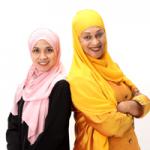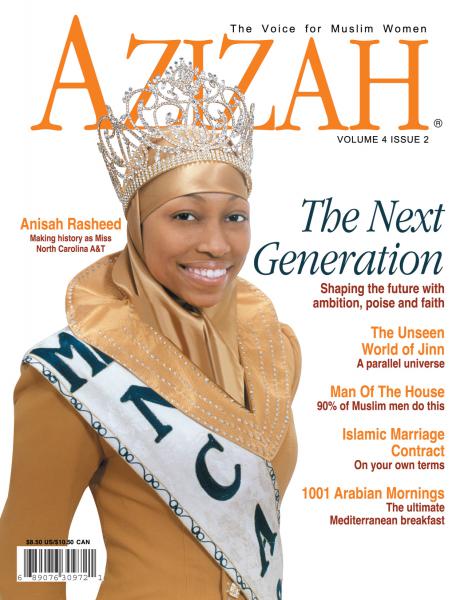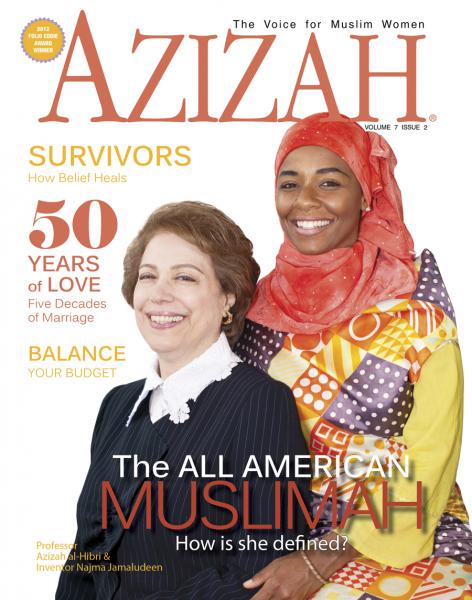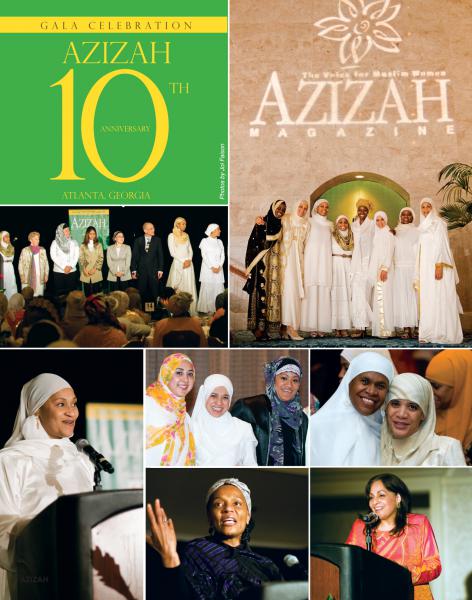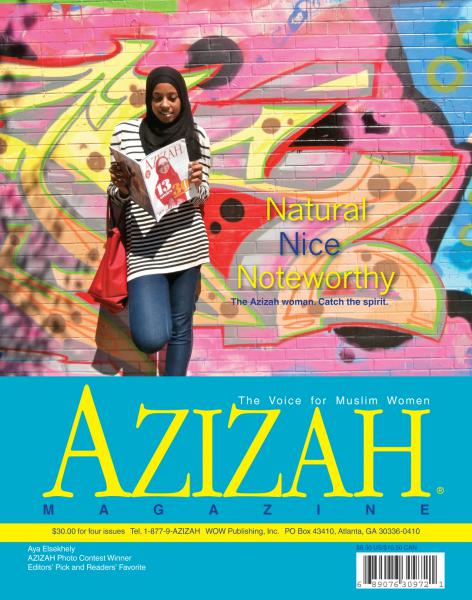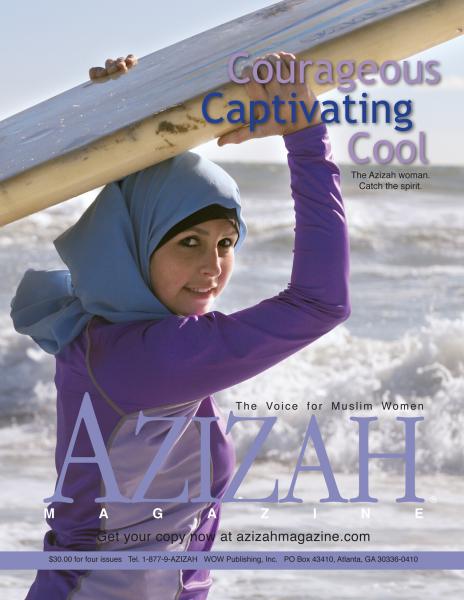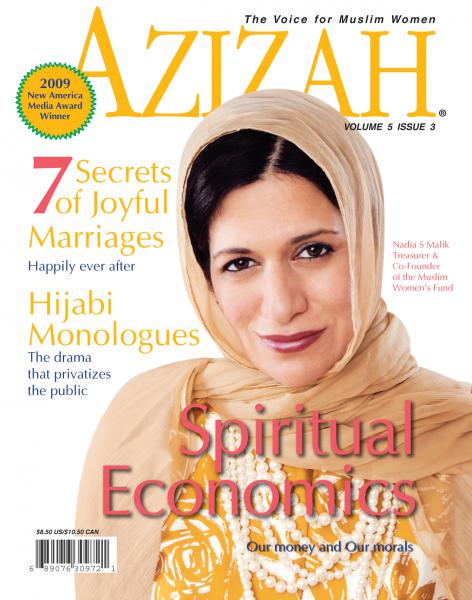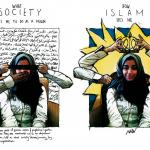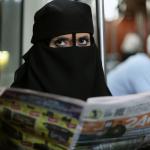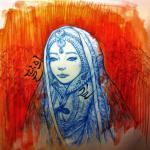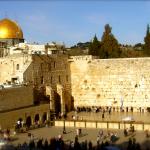Azizah is a magazine in which Muslim women tell their own stories, in their own words. Hear from founder Tayyibah Taylor on how Azizah got started, why it’s important to Muslims and non-Muslims alike, and what’s next for Muslim womens’ magazine.
IMOW: You founded Azizah with Marlina Soerakoesoemah in 1999. How has the magazine managed to evolve as new media technologies have transformed the publishing industry?
Tayyibah Taylor: We have a cyber-office: Marlina is in Seattle, our photo editor is in Chicago, and I’m here with the editorial team in Atlanta. Many magazines have now gone digital. We have maintained the print magazine because many of our readers have actually requested that, saying they enjoy holding and seeing the magazine. Azizah is very colorful and bright with a lot of art; it speaks to the senses in a way that I think is best translated in print. We are open to creating digital editions as well. We have basically gone with the flow of the publishing industry, but like to really keep our finger on the pulse of the readers.
Could you tell us how the Azizah adventure began? Was it the result of a Eureka moment or of a long process of reflection?
It was more the Eureka-kind of moment. I was invited to a conference of Muslim women in Chicago in 1992, and stepped inside the conference room filled with very empowered, accomplished, and energetic women. I wanted to encapsulate that experience and put in a magazine. Why a magazine? Because writing is my great love and a talent I have. I also love the magazine format that is a cross between a book and a newspaper. What I experienced in that room was so drastically different to what other people and the media were saying about Muslim women at the time that I felt compelled, to create a vehicle that would depict Muslim women as empowered and diverse beings.
I grew up in Toronto, at a time when I saw no people of color represented in the media positively. It was always a negative story. I remember very distinctly the moment I first picked up Ebony magazine with people of color portrayed as contributing citizens. Even though I come from a family of professionals – my father was a chemical engineer, one of my uncles was a doctor and another relative the first black attorney in Canada—I I still had still internalized a sense of inferiority because of that marginalization in the media. And so perhaps, this was the seed for Azizah. Now when I see Muslim women picking up Azizah for the first time, I see them experience that same feeling I had so many years ago as a child, picking up Ebony.
"Azizah is a magazine where Muslim women can shape their own agenda and identity; other media are having the conversation for us, I think for generations - even centuries- Muslim women have been defined either by Muslim men or by people who are not of the Muslim faith"
African-American author Bobby Wright coined the term “mentacide” to describe the debilitating effects stereotypical images can exercise. Images are powerful. They shape and control the narrative. How would you characterize mainstream portrayals of Muslim women?
I think they are improving, but I definitely believe that images of people, positive or negative, are internalized both by those who are portrayed and those who are looking at them. Everyone is internalizing these images and they manifest themselves when you interact with people. Muslim women in particular have been reported on largely through the lens of Middle-Eastern politics. I see four main stereotypes portrayed over and over. The first is Muslim woman as victim—of men, war, religion, or circumstance. She is voiceless, powerless, a non-entity. The second is the vamp, the exotic harem girl that has evolved over time. Before it was the “I Dream of Jeannie” style depiction and now it is for example, “Muslim Women Wear Red.” The exotic other has transmuted but still involves looking at Muslim women with a tourist mentality. Then there is the evil terrorist who is going to blow you up. Finally, you have what I would call the turncoat who says, “Everything is wrong with Islam, all Muslims and all Islam need reforming, all Muslims are on the wrong path.” There are others too like the “I have to wear my hijab” entitled noisemaker.
This is brings us to why Azizah is so important. Its alternative images of Muslim women constitute its most defining and radical feature. How important are these to Muslim women’s self-identities?
It is extremely important that the media portray you accurately. Azizah is a magazine where Muslim women can shape their own agenda and identity; other media are having the conversation for us, I think for generations—even centuries—Muslim women have been defined either by Muslim men or by people who are not of the Muslim faith. Azizah is a place where she can speak for herself about her lifestyle, issues, accomplishments, and ambitions. It shows Muslim women of all different backgrounds, cultures, and degrees of religiosity.
Azizah is about Muslim women reclaiming the right to self-determination and self-representation beyond neo-Orientalist stereotypes and misogynistic readings of Islam. Does its mandate, extend even further? Do non-Muslim women and non-Islam related institutions subscribe to and read the magazine?
Yes. We have spilled over into the mainstream community and have become a resource for several news outlets who call us to comment on issues about Muslim women. We also have Christian and Jewish subscribers. We recently received a letter from a Christian reader which said “I’m not Muslim, but I enjoy reading this magazine because the women are modestly dressed,” adding that with Azizah, she could really be assured that the articles had substance to them.
Azizah covers a broad range of topics—fashion, spirituality, food , sports, health, art—and does not shy away from difficult topics like divorce, abuse, prison, or AIDS. How would you describe the magazine’s editorial policy or vision?
We strive to be thought provoking, not provocative. This defines our tone and direction because many other magazines focus on what’s going to sell and what is going to be the most provocative. We stay away from anything salacious, but we do want to provoke thought and conversation. When we address disability, child custody, or abuse in the Muslim community—issues that people might say are difficult— we adopt a very matter-of-fact and not a sensationalized perspective. This is real journalism. You can get to the meat of the issue without all of the fireworks. We’re writing Azizah for Muslim women who are in America. All of the articles are written by Muslim women, and so they’re written from our vantage point. Azizah is the place where you can go to hear the voice of Muslim women unfiltered. I think it’s important to have at least one place to do this. That’s our editorial vision really: to create and be a vehicle for the voice of Muslim women, to be able to celebrate their accomplishments and discuss their issues.
You are an inspiration to Muslim women. You have been recognized as one of the top 500 most influential Muslims in the world. What message do you have for young Muslim women?
Don’t put limitations on yourselves. If you have a dream, an ambition, a goal, an aspiration, keep your intention and vision clear and work towards that goal. Understand that the obstacles are there to shape your character. It’s a matter of combining persistence and passion, and continuing on towards your goal. Also understand that your work and your worship can blend. If you are working with the intention of accomplishing something that reaches beyond yourself and into the world then the work becomes this wonderful form of worship. We have a very exciting, talented group of young Muslim women coming up, and I’m really excited to see what they are going to be as they become the new architects of the Muslim American community.
What plans do you have for Azizah? What new developments and directions do you foresee in the near future?
We foresee creating digital special editions and launching Azizah International. Azizah right now is focused on Muslim women in the US and Canada, that’s how we premiered. We have one section “Global Voices” that features the lives and accomplishments of Muslim women outside of the US. But that is only one department. As I travel around the world, people always say “Please create a magazine, like Azizah for Brunei, Australia, New Zealand or elsewhere.” We have said “No, we can’t!” But we definitely see the need and the desire to expand. Azizah International will be like Azizah but will feature Muslim women from all around the world and more global issues. It will most likely be a digital edition. In short, we will continue the path that we’ve been on and expand it. We’re already in university libraries and public libraries across the country and around the world. We want the Azizah woman to be the one that comes to mind when you hear the words “Muslim women,” not those stereotypes—victim, vamp, or terrorist.
